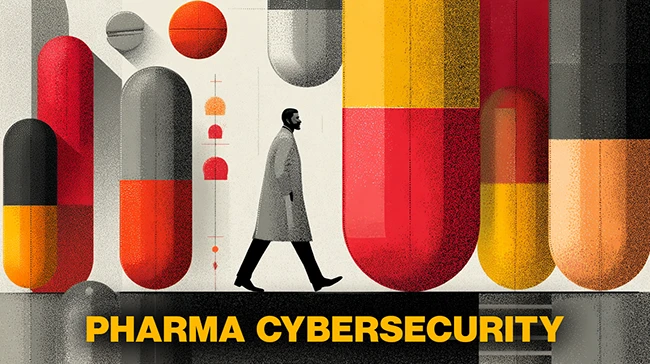In the pharmaceutical industry, clinical trial data, patient records, and proprietary drug formulas are prime targets for cybercriminals. These high-value assets make the sector a constant focus for attacks. Disruptions to research or medicine distribution can have life-threatening consequences.

“During global health crises, cyber attackers swiftly exploit vulnerabilities. The COVID-19 pandemic saw a fivefold increase in phishing attempts targeting WHO, with attackers impersonating leadership to distribute malware,” said Flavio Aggio, CISO at the World Health Organization.
Cyberattacks targeting the pharmaceutical industry
According to the IBM Cost of a Data Breach Report 2025, pharmaceutical data breaches had an average cost of $4.61 million.
Ransomware is also a major concern. Inotiv, a pharmaceutical R&D company, was hit when attackers encrypted parts of its network, shut down systems, and forced operations offline. They also claimed to have stolen and posted over 170 GB of sensitive data. In Germany, pharmaceutical wholesaler AEP was in a similar situation since IT systems were partially encrypted, putting medicine deliveries to more than 6,000 pharmacies at risk.
87% of healthcare and pharmaceutical companies say they have been negatively affected by a breach in their third-party ecosystem.
Cencora, one of the largest pharmaceutical distributors in the US, suffered a data breach in early 2024 that exposed patients’ personal and health information. The company confirmed attackers accessed records tied to prescriptions and treatments, and the breach has extended to at least 27 pharmaceutical and biotechnology companies. To settle class-action litigation over the incident, the company and its subsidiary, The Lash Group, agreed to pay $40 million.
“The most common threat to healthcare systems are phishing attacks, sent in hopes that just one person, out of thousands, clicks a link or opens a file contained within the email. That file or link gets the hackers’ foot in the door to the network, and from there, they can either lock the system down with ransomware or steal data,” warned Eric Demers, CEO of Madaket Health.
The high cost of cybersecurity breaches
As in any industry, the first impact of these incidents is financial. Ransomware can lock up data, and sometimes companies end up paying to get it back. Even if they don’t pay, fixing systems and recovering lost data is expensive. Downtime can stall research, slow production, and delay shipments, which all adds up. Then there are regulatory fines for mishandling patient data or sensitive information.
Regulatory problems are another headache. Pharma companies have to follow regulation like HIPAA and GDPR. If a breach exposes patient data or leaks intellectual property, it triggers investigations and enforcement actions. That can mean fines, audits, mandatory reporting, and closer oversight. Breaches can also slow approvals for new drugs and strain relationships with partners.
And most importantly, it’s about human health. Losing or altering clinical trial data can delay new treatments. Attacks on production systems can halt manufacturing or compromise drug quality. Even brief downtime in critical systems can affect patients who rely on these medications or ongoing trials.
Key strategies for strengthening cybersecurity
Risk assessment: Regular risk assessments help detect threats early. Based on this information, strategies and security initiatives are developed to mitigate those threats.
Watch your IoT devices: IoT is a weak spot for the pharma industry. As the number of devices grows, maintain an inventory that tracks security risks for all lab sensors and medical devices. Ensure high-risk devices use authentication and encryption, and include them in your patch management strategy.
Collaboration: Open communication and collaboration with other companies allow sharing information about threats, as well as experiences and ideas on how to strengthen protection.
Vendor risk assessments: Supply chain attacks can bypass internal security measures and catch pharmaceutical companies off guard. Screening third-party vendors helps prevent this. Focus on their processes for handling data, preventing cyberattacks, and maintaining privacy.
Employee training: Make sure your team understands the risks. Employees should be able to spot phishing emails. They should also know how cybercriminals steal identities, set up fake websites, and pressure people into making risky decisions.

